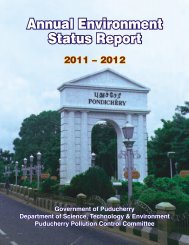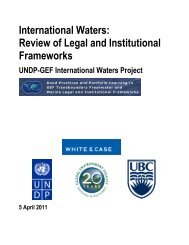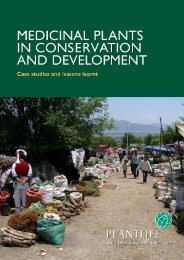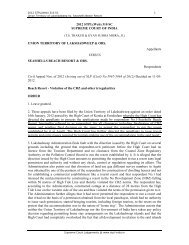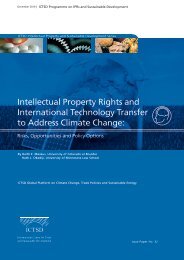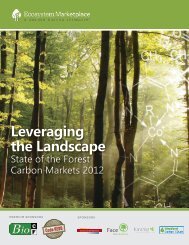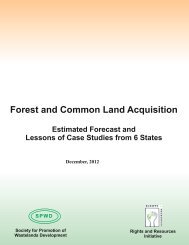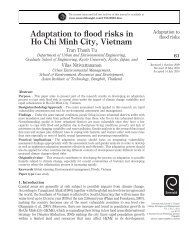DEFORESTATION AROUND THE WORLD - India Environment Portal
DEFORESTATION AROUND THE WORLD - India Environment Portal
DEFORESTATION AROUND THE WORLD - India Environment Portal
Create successful ePaper yourself
Turn your PDF publications into a flip-book with our unique Google optimized e-Paper software.
Geospatial Analysis of Deforestation<br />
and Land Use Dynamics in a Region of Southwestern Nigeria<br />
This informs gap in our knowledge. However, certain factors have been advanced to be<br />
responsible for deforestation and forest degeneration.<br />
3.3 Causes of deforestation<br />
Deforestation occurs for many reasons but it is important to distinguish between the causes<br />
that are directly related to deforestation and those that are underlying. The direct causes are<br />
those activities (by individuals, corporations, government agencies, or development<br />
projects), which clear forests. Underlying causes are those behind the direct causes, which<br />
motivate the direct causes. (http://www.wrm.org.uy/deforestation/UN report.html).<br />
Direct causes include commercial timber production, clearing of land for agriculture and<br />
urban expansion, and harvesting of wood for fuel and charcoal. These activities also open<br />
up forests by the construction of access roads to logging sites, fragmenting the forests and<br />
facilitating further clearance, resource extraction, and grazing by locals and commercial<br />
organizations (Rowe et al., 1992; UNDP, UNEP, World Bank and WRI, 2000; State of the<br />
World's Forests, 2001). According to the United Nations Framework Convention on Climate<br />
Change, the overwhelming direct cause of deforestation is agriculture. Subsistence farming<br />
is responsible for 48% of deforestation; commercial agriculture is responsible for 32% of<br />
deforestation; logging is responsible for 14% of deforestation and fuel wood removals make<br />
up 5% of deforestation (UNFCCC, 2007).<br />
Indirect (underlying) causes of deforestation include population growth, policies,<br />
agreements, legislation, lack of stakeholder participation and market factors that encourage<br />
the use of forest products, leading to loss, fragmentation or degradation (Rodgers, Salehe<br />
and Olson, 2000). Other causes of forest loss are conflict, civil wars and lack of good<br />
governance (Verolme and Moussa, 1999).<br />
In Africa as in all parts of the world, deforestation were caused by a combination of natural<br />
and human factors, the chief of which has been the conversion of forest lands to agricultural<br />
land (Adesina, 1997; Rowe et al., 1992). As Williams (1990) reported, the introduction of new<br />
crops and new methods of exploitations around 1600 radically altered tropical forests. It was<br />
reiterated that forests were cleared to make way for cash crops such as, rubber in Malaysia<br />
and Indonesia, coffee in Brazil, tea in <strong>India</strong> and China, sugar cane in the Caribbean, tobacco<br />
and oil palm in Asia.<br />
Ola-Adams (1981) attributed the removal of forested areas to intensive agricultural<br />
practices. It was reported that approximately 2,000 hectares of western edge of Ogbesere<br />
forest reserve in Nigeria had been cut over and replaced by permanent agriculture. The<br />
study further revealed that in some other parts of the high forest, several areas of forest<br />
estate were being de-reserved for the establishment of agricultural crops. Besides, in the<br />
current efforts to diversify the country’s economy, large areas of high forest zones were<br />
being cleared and planted with food and tree crops; 45,845 ha. for food crops; 10,000 ha. for<br />
oil palm; 73,000 ha. for cocoa and about 140,000 ha. for rubber plantations.<br />
There are many causes of contemporary deforestation, among them are corruption of<br />
government institutions (Burgonio, 2008; WRM, 2003), the inequitable distribution of wealth<br />
and power (Global Deforestation, 2006), population growth (Marcoux, 2000), and<br />
overpopulation (Butler, 2009; Stock and Rochen, 2009), and urbanization (Karen, 2003).<br />
Globalization is often viewed as another root cause of deforestation (YaleGlobal, 2007; Butler,<br />
2009), though there are cases in which the impacts of globalization (new flows of labour,<br />
capital, commodities, and ideas) have promoted localized forest recovery (Hecht, et al, 2006).<br />
151



